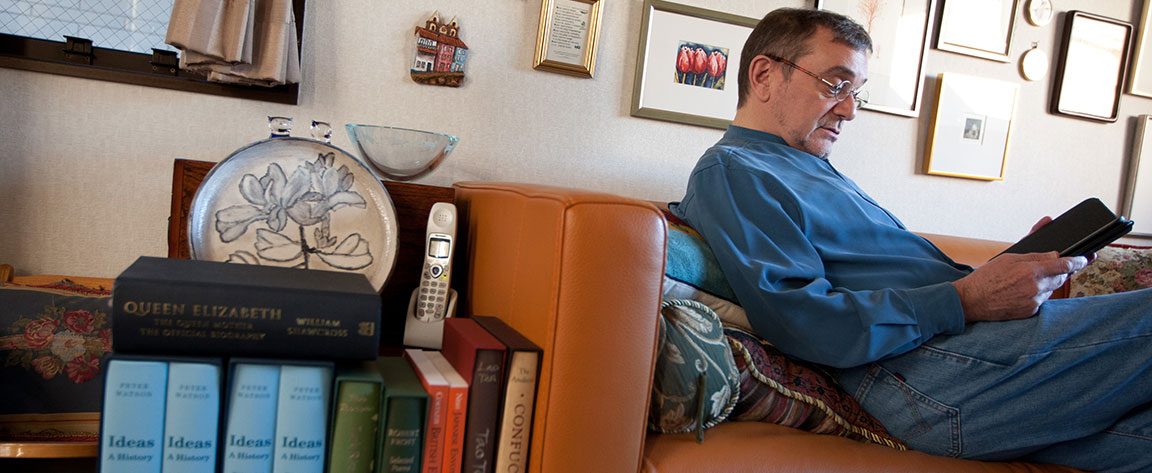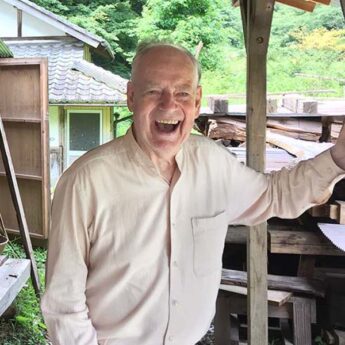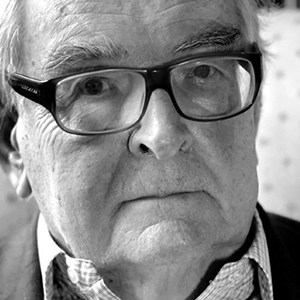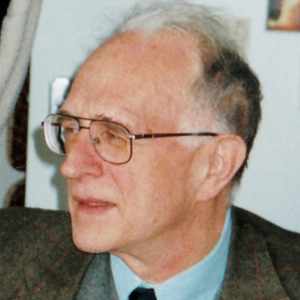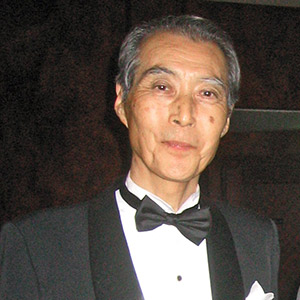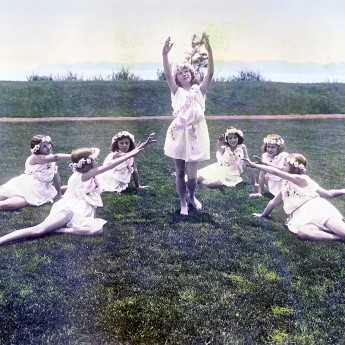My subhead for Ian de Stains’ retirement interview in the February 2011 issue of BCCJ ACUMEN was: “But don’t write Ian de Stains’ obituary yet”.
Sadly, that time has now come.
Indeed, it was Ian who paved the way for Custom Media to launch this magazine. In September 2009, Robert Heldt and I were brainstorming for a flagship publication to help establish the fledgling firm. Robert cold-called Ian until he got a 10-minute slot to propose our idea for a membership magazine, with me as editor, to the Executive Committee (Excom) of the British Chamber of Commerce in Japan (BCCJ).
Ian had warned Robert: “We get a lot of proposals, most of which fail, so don’t build up your hopes”. There were serious sceptics, who had probing questions about sustainability, quality and advertising.
But within two hours, Ian had phoned to say, “Congratulations, Robert, they liked you and your idea! When’s the first issue?”
Arrival in Japan
Born to a French–English father and Scottish mother in Wombwell, near Sheffield, Ian attended a local grammar school before joining the Royal Academy of Dramatic Arts (RADA) in London. After graduating, he became an announcer for Yorkshire Television. He then joined the BBC, which seconded him to Japan’s only public broadcaster, NHK, in 1976.
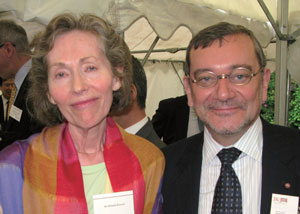
Ian with Miranda Kenrick
Ian was taken aback. “I knew Japan was ‘different’, but I hadn’t realised I needed a pineapple to enter!” He eventually realised he had mistakenly joined the quarantine queue—instead of that for immigration—behind tourists returning from Hawaii.
Refugees International Japan Executive Officer Jane Best OBE said: “Ian was a true Brit at heart, but a Brit that never wanted to return to the sceptred isle. He loved Japan and continued to love the UK at a distance”.
Given a modest tatami room in Takadanobaba, and with little knowledge of Japan or its language, it was a hardship posting without the expat package. Ian was appointed four years at NHK, later freelancing also for the BBC in Tokyo, before joining a small communications agency.
A new mission
After becoming a member of the BCCJ in 1980, Ian was appointed executive director in 1987. With just 100 members, the BCCJ had a hand-cranked mimeograph machine to turn out the monthly newsletter, but no logo, mission statement or strategy.
Paul Madden CMG, British Ambassador to Japan, said: “I first served on the BCCJ Excom with Ian nearly 30 years ago. For many decades he played a pivotal role in UK–Japan relations here in Tokyo, not just through the BCCJ, but in many other organisations, too”.
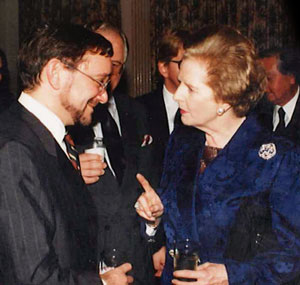
Meeting Margaret Thatcher
About one month later, Ian was stunned to be appointed an Officer of the Most Excellent Order of the British Empire (OBE).
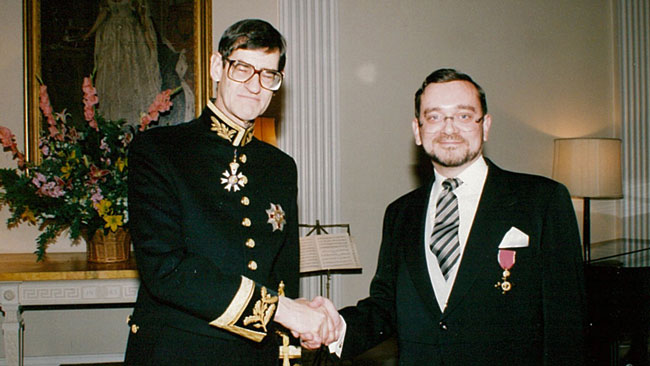
Sir John Boyd KCMG at Ian’s OBE investiture ceremony.
Ian insisted, with a wry smile at his BCCJ retirement luncheon speech in 2011, that he had been gonged for his commitment to UK–Japan commercial and community ties, and not because of—or despite—clashing with the Iron Lady.
Speaking to BCCJ ACUMEN about the award, Ambassador Madden said: “He was respected and admired by all of us at the British Embassy Tokyo, and his appointment as OBE was richly deserved”.
One major private–public sector bilateral achievement led by Ian was the opening in 1998 by Prime Minister Tony Blair of the British Industry Centre (BIC) in Yokohama, which gave dozens of UK firms unprecedented market access, bilingual help and cheap rents.
Susumu Kaminaga, BCCJ Excom member, said: “I first met Ian at the newly opened BIC. He welcomed me with a detailed presentation and I later became a BCCJ member. He was always so kind to me”.
Always happy to help others, Ian even touched those who he had never met. In 2015, I helped him compose the history of the BCCJ for a book by writing a section on BCCJ ACUMEN.
Sir Hugh Cortazzi GCMG, British ambassador to Japan in 1980-1984, said: “I was most grateful for the piece that Ian wrote at my request about the BCCJ for the Britain and Japan Biographical Portraits series that I edited. As I did not know him personally, I don’t feel qualified to add to an obituary other than to express my thanks for his contribution to the promotion of British trade with Japan through his work with the BCCJ”.
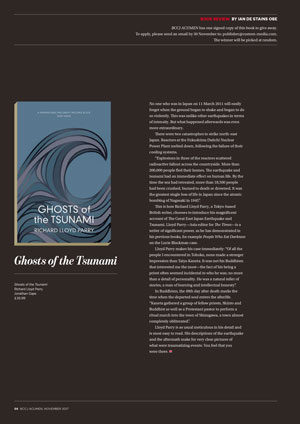
Ian’s final book article for BCCJ ACUMEN
In late 2010, Ian had emergency heart surgery. After recovering and retiring from the BCCJ, he accepted my offer to write for BCCJ ACUMEN. The result was two of our most popular pages—“If You Ask Me”—an often-irreverent take on UK–Japan and global affairs—and his notable book reviews.
Guy Perryman MBE, BCCJ Excom member and DJ at the InterFM897 radio station, said: “I had missed Ian’s regular columns in the December 2017 issue of BCCJ ACUMEN and was wondering if everything was okay. I always enjoyed reading his articles, which were written with great intelligence, a reflection of the man himself. I will always miss those columns and more so bumping into Ian at various events”.
Best said: “Ian’s favourite author was Alan Bennett, and the family chose one of his books to accompany Ian in his coffin. Bennett once used the quote: ‘All knowledge is precious whether or not it serves the slightest human use’. Ian sought this in books, periodicals and the hundreds of people he met through his busy life”.
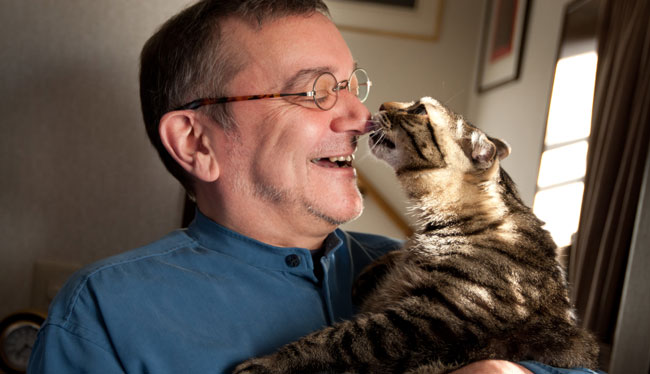
 SIR DAVID WARREN KCMG
SIR DAVID WARREN KCMG
Chairman, The Japan Society
Former British Ambassador to Japan (2008–2012)
Ian and I first crossed paths in the late 1970s and early 1980s, when he had just come to Japan with the BBC. I was on my first posting to the British Embassy Tokyo, and we were both in the Tokyo International Players drama group. But it was in the 1990s that we really got to know each other.
Ian became BCCJ executive director and I had returned to Japan with my wife Pamela, as commercial counsellor at the embassy.
The first thing I realised was how much the BCCJ had changed. It had always had close relations with the embassy, because the promotion of British exports to Japan had always been at the centre of our activities. But I had remembered the BCCJ from my first posting as more of a social networking group than a business organisation focused on trade and investment policy.
Ian had taken over at a difficult time, but brought enormous professionalism and dedication to the job. And it was very much thanks to this, as well as to the support of some of the heavyweight British firms in Tokyo, that the BCCJ’s reputation went from strength to strength. As Japan became the focus of successive trade promotion campaigns, the BCCJ was integral to what became a strong and enduring trade and investment relationship between Britain and Japan.
And Ian—patient, reassuring, supportive, efficient, unflappable, friendly and full of practical good sense—had helped the BCCJ become a source of best practice in everything from helping small and medium-size enterprises establish themselves in the market, to advising on, and taking part in, our campaigns in the UK to drum up more interest in Japan.
Rediscovering the embassy–BCCJ links when I came back as ambassador in 2008 was one of the great pleasures of my new role. I was delighted when a visiting Foreign & Commonwealth Office minister, after a breakfast meeting with the BCCJ, commented to me how much more impressive his discussions had been with the chamber compared to a number of countries where, he said, the level of engagement was much lower and lighter-weight. Ian was at the heart of all that, and it was for this work that he received the OBE in 1994.
And he helped put the BCCJ at the centre of the British presence in Tokyo. At no time was that more important than in 2011 when the country suffered the terrible catastrophe of the Great East Japan Earthquake and Tsunami and the nuclear disaster at Fukushima. Ian was part of the group of British people, based around the BCCJ, who stayed in Tokyo, reached out to provide assistance to communities in Tohoku, and helped to steady everyone’s nerves at a frightening time.
It was through Ian’s love of poetry and acting that Pamela and I became his friends, particularly with the annual Christmas Crackers event at the embassy. Ian had studied at RADA, and had briefly been an actor before joining the BBC as an announcer and producer.
Crackers was based on an anthology he’d put together one Christmas as a young BBC man, and the tradition re-started, I think in the early 1990s, as a show performed for charity each year in the Ambassador’s Residence. It was a delight and a privilege for us both to be part of this, with Ian and Hajime, Ian’s partner, and it was a pleasure to listen each year to Ian’s beautiful and sensitive voice reading his literary favourites of T.S. Eliot, Dylan Thomas and Charles Dickens.
And it was enormous fun, too. When we think of Ian, it’s the impish sense of humour that comes to mind, as well as the entertaining raconteur, especially recalling his early days on stage. And we remember him, not just in his public role, and not just on stage, but at home, relaxing with Hajime, the cats, and a few close friends.
He was a lovely man, full of wisdom and kindness. He will be much missed by all of us. But he will live on in all our memories.
British Ambassador to Japan
Ian will be remembered as a lovely, really decent man, highly intelligent with a wide range of interests, and a real passion for Japan, the country that he had called home for almost all of his adult life.
ALISON CASH
We are so in awe of all the lovely tributes to Ian. We would like to say a big thank you to everyone who attended Ian’s wake and funeral and who offered such kind words to my husband Paul and me. As Ian’s sister, my memories and those of our family will remain in our hearts.
JANE BEST OBE
Executive Director, Refugees International Japan
Although Ian enjoyed meeting many interesting people, he was also a private man and never happier than curled up at home with his cat and a good book.
GRAHAM HARRIS OBE
Former BCCJ President (1992–97)
On a visit to Japan in the mid-1990s, the then-British Prime Minister Margaret Thatcher successfully negotiated a much sought-after Japanese securities licence for National Westminster Bank Plc. But the bank soon changed strategy and handed it back. However, dreading an angry reaction, no one told Thatcher! But on her next trip to Tokyo a couple of years later, Ian thought it could be embarrassing if she didn’t know this in meetings with Tokyo officials. So Ian told her. Thatcher’s first reaction was, naturally, that Ian was wrong. Most people would have backed down at this. But men from Yorkshire are made of stronger stuff and Ian held his ground. After huffing and puffing, Thatcher eventually accepted this news and a diplomatic incident was avoided. Bravo Ian!
SIR GRAHAM FRY KCMG
Former British Ambassador to Japan (2004–2008)
Ian was a brilliant BCCJ executive director, tactful and patient, but always sharply focused on obtaining the best possible results for his members and the UK. He made a huge contribution for many years to the British presence in Japan. He was kind and caring, as his numerous charitable activities and many friendships showed.
I particularly remember Ian’s pleasure when civil partnerships were introduced and he and Hajime registered theirs in a simple but official ceremony at the embassy.
PHILIP GIBB OBE
BCCJ president (2011–2013)
It was particularly fitting, that Ian received a BBA in recognition of his tremendous service to the British business community. Ian once mused: ‘I wonder how long the BBA will last before it becomes stale—three, five years, more?’ Ten years on, I am pleased to say, the BBA shows no signs of slowing down.
FRANK MOORHEAD
Translator
Ian was always helpful, polite, generous and very competent. He did wonders for the BCCJ and the many other organisations in which he was involved. He was a very private person and participated in charitable activities. Ian was an excellent confidant, always did his best to defuse conflicts, and was invariably on the side of fairness and justice.
BRIAN GREGORY
SCT Inc.
Ian was an intelligent, articulate speaker who was at home discussing any subject. More often than not he was more entertaining than those addressing the chamber at events.
Ian, you were a true friend. May the Lord bless your soul and may you rest in eternal peace.
JENNY WHITE
British Council (Japan 1989–1999)
Ian had a sense of humour that could make light of the absurdities in any situation, while dispensing sage advice. He had a strong sense of the right thing to do and sought harmony and equilibrium in every situation, expertly navigating between the cultures of Britain and Japan and understanding their vital contribution to successful business development.
COLIN MASON
MTS GK
Ian was a great source of help and advice, especially when I returned to Japan in 2000 to set up the subsidiary of a UK firm at the BIC in Yokohama. In recent years, I assiduously read his book reviews in BCCJ ACUMEN. And I will of course always recall with a smile the happy memories of the Christmas Crackers that he produced at the Ambassador’s Residence for many years. A kind and friendly man, Ian will be sadly missed. May his soul rest in peace.
ANNE GOOD
Executive, Career and Life Coach, Eureka!
Ian was, quite simply, the person you needed to know in Tokyo. I found him charming, intriguing, knowledgeable, intelligent and friendly. He was a great listener. We shared many a lunch putting the world to rights (or in our world we did) and enjoyed frequent conversations on our favourite subject—the development of people.
JONATHAN STUART-SMITH
Former BCCJ Excom Member (2008–2010)
Even near the end of his tenure, during challenging economic times, Ian launched the British Business Awards and BCCJ ACUMEN, both of which are thriving today. Ian was very skilled at working with Japanese business and culture. We owe him a huge debt for his tremendous public service over a lifetime in Japan.
